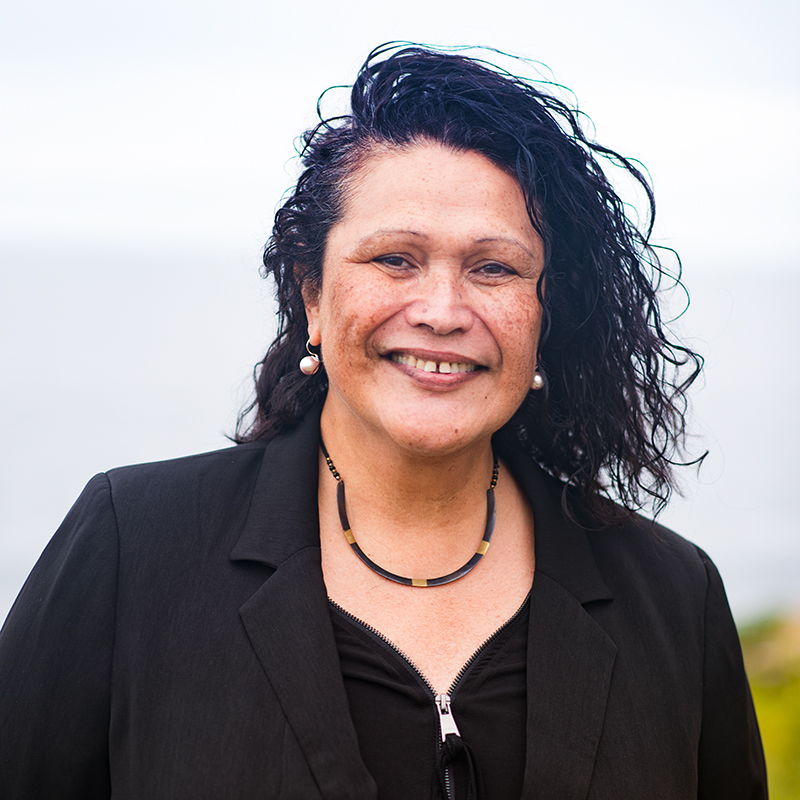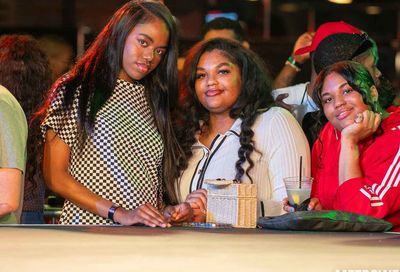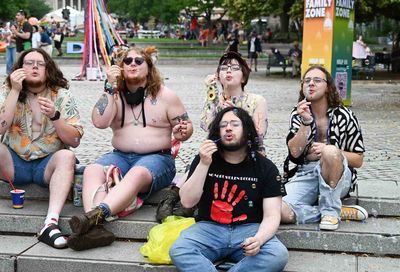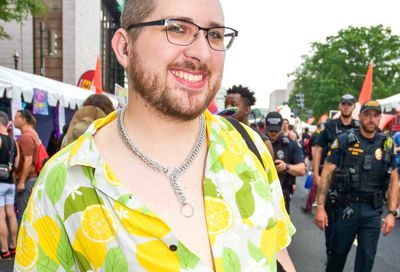Women’s March on Washington: “Welcome to the revolution of love”
President Trump's inauguration gave tremendous, powerful voice to the opposition, as half a million people took to the streets in D.C.

“Look around!” Cindy B. swept her hand in a semi-circle, pointing to the mass of pink hats and protest signs filling the National Mall. “This… is… real.”
It was Saturday, January 21, 2017, one day after the inauguration of President Donald J. Trump. It was a day of awakening for America, and a day of uprising for more than half a million protesters who took to the streets of Washington, D.C., for the Women’s March on Washington. They were there to preserve — and reinforce — the rights of women, to decry a newly installed administration already seemingly hell-bent on dismantling every step of forward-thinking progress made under eight years of the Obama. They were there to let Trump know that America was no place for bigotry, misogyny, for “grabbing pussies.”
It was a day of anger and outrage — of the peaceful sort. It was a day of pink knitted pussy hats and picket signs emblazoned with slogans like “If Men Could Give Birth, Abortion Would Be a Sacrament” and “Keep Your Policies Off My Body.” It was a day of spontaneous chants — “We want a leader, not a creepy tweeter!” — and middle fingers raised high and defiantly at the freshly minted Trump International Hotel. And it was a day of love, of unity, of support, and of hugs.
Many, many hugs. Warm, welcoming, much needed hugs.
It was a day of showing the GOP administration that if it’s a fight they want, it’s a fight they’ll get. A day that could not be swept out of view with claims of “fake news” or “alternative facts.” A day in which women — and, indeed, any person of any race, creed, age, sexuality, or gender — came together to point the way to justice. A day in which America showed why it was, in fact, already great — not, as the president had thundered in his Inaugural speech the day before, a land of “carnage.”
For some at the march, it was a day sparked by the rise of hate.
“After the election, one of my students drew a Swastika in my classroom,” says Cindy B., an eighth grade teacher from Florida. “Another little white boy called a black boy a slave. And then, a person in administration forwarded ‘cartoons’ bashing every single thing about Obama. I reported that one to the paper, and the other two to the administration. I’m not going to tolerate it.
“If they fire me, I don’t care.”
Cindy is worried about the bigotry she sees reflected at a national level, as Trump settles into his new position of ultimate power at the White House, surrounded by an administration of men who would strip the LGBTQ community of its rights, that would deny the right to an abortion, that would spit in the face of scientific fact and push the planet toward ecological demise.
So Cindy marched, along with more than an estimated 3.2 million people worldwide in 300 sister marches. In Washington, marchers found solidarity, purpose, and, most of all, a renewed sense of hope.
“Being a Muslim in America, growing up in the rural south in Tennessee, this march brings tears to my eyes,” said Ahil Sher-Mohammed, an 18-year-old freshman at GW University. “I was scared throughout most of the campaigning. I was scared when Trump was elected. I don’t think I’ve ever felt more safe in my life seeing what is going on here today, knowing that people are cheering for me. People are standing by my side. I honestly am grateful. I am grateful for these people that will do whatever it takes to stand up for what is right.”
Though the march maintained its female perspective, it was also a clear repudiation of Trump. Throughout the morning and into the early afternoon, celebrities, politicians and everyday people took to the main stage and gave the day voice.
“Welcome to the revolution of love,” said Madonna to ecstatic cheers. “To the rebellion, to our refusal as women to accept this new age of tyranny, where not just women are in danger but all marginalized people, where being uniquely different right now might truly be considered a crime. It took this horrific moment of darkness to wake us the fuck up.
“The revolution starts here,” she continued. “Yes, I am angry. Yes I am outraged…. [But] we cannot fall into despair. As the poet W.H. Auden once wrote on the eve of World War II, we must love one another or die. I choose love. Are you with me? Say this with me: We. Choose. Love.”
“Make no mistake — we are, every single one of us, under attack,” proclaimed actress America Ferrera. “If we do not stand together, fight together and march together, then we will lose…. If we commit to what aligns us, if we stand together, we stand the chance of saving the soul of our country. It’s been a heartrending time to be both a woman and an immigrant in this country. Our dignity, our character, our rights have all been under attack, and a platform of hate and division assumed power yesterday.
“The president is not America. His cabinet is not America. Congress is not America. We are America. And we are here to stay.”
Adeola Oyelabi drew inspiration from Ferrera’s words.
“[Trump] does not represent America — we do,” said the 28-year-old daughter of a Nigerian immigrant. “This is what America looks like. If I could talk to him, I would say, ‘Look at all of this. And remember we’re not going to stop fighting. Everything you say and do affects people on a personal level.'”
Her sister, Remi, who identifies as queer, was grateful that the march didn’t focus solely on equality for women, but on minority groups as well. “Equality shouldn’t have to wait,” she said. “I shouldn’t have to wait my turn to have equal rights. If I have an issue as a person of color, that’s no less important than a Muslim person. We shouldn’t have to take turns, like, ‘No, you’ll still be oppressed while the first person goes.'”

That collectivism, echoed in the diversity of the crowds that swarmed through the streets of D.C., only added to the anti-Trump sentiments of many of those in attendance.
“I feel like this is a part of history,” said Sera Idoko, 23, of New York. “We have to show Trump that we’re not going to stand for the things his administration stands for. I feel like this turnout, in itself, is something that’s going to show the world that we’re not going to stand for this.””The march is very anti-Trump,” said a federal employee who declined to give a name for fear of being fired. “But when you are anti-Trump, you are pro-gay or pro-trans. You are pro-women. You are pro-immigrant. You are pro-Black Lives Matter. You are not anti-anything — except anti-Trump, who is against all of those communities.”
“The march is very anti-Trump,” said a federal employee who declined to give a name for fear of being fired. “But when you are anti-Trump, you are pro-gay or pro-trans. You are pro-women. You are pro-immigrant. You are pro-Black Lives Matter. You are not anti-anything — except anti-Trump, who is against all of those communities.”
Another federal employee was inspired to march because she was turned off by the tenor of Trump’s campaign, including his use of inflammatory rhetoric and his disparaging comments about women and minorities.
“I am really concerned about some of his policies,” she said. “I’m especially concerned for some of my friends who are Muslims, or immigrants, or black, or any group that does not look like Trump or have the money he does, because I don’t think he’s going to treat them fairly. I don’t think he thinks about anyone else but himself.”
Perhaps the most frequently voiced criticism of the Women’s March was its lack of a unifying issue around which to rally. But for many of the attendees, it was impossible to choose just one issue.
“I’m so overwhelmed with everything,” said Wendy Marco of Leesburg, Va. “I feel there’s so many things to fight, we’re going to lose some of them because there’s just so many. I think the fact that we all have a different reason to be passionate about this, the diversity of the crowd, and the issues that brought us here, is pretty freakin’ powerful. If we try to separate and go our own little ways with our own issues, that may not work. But together? Trump’s got to stand up and look at this.
“I feel like this administration is going to take us back in terms of LGBT rights, women’s rights, even the environment,” said her friend Terry Azie, also of Leesburg, who came with daughters Erin, 18, and Lauryn, 16, and carried a sign reading, “My arms are tired from holding this sign since the ’70s.”
Emily Sherwood, a 58-year-old activist from Lynn, Mass., felt people are energized in a way they haven’t been since the days of the Civil Rights Movement or the Vietnam War.
“The biggest legacy of the Obamas is the whole generation of young people who grew up with them as president and thought progressivism was the norm. All the stuff with Trump, and the people who backed him, has always been here in this country. It’s a reaction to Obama, it’s a reaction to progress. But now people are realizing, ‘Oh, my God, we actually have to keep fighting.'”
“The Republican Party, our congressmen, our senators have got to take notice,” added Marco. “They’re next on the chopping block this next election. Their jobs are on the line, and if they’re not seeing this, they’re digging their heads in the sand.”
“What I fear is that people will put on Facebook, ‘I went to the march,’ and they’ll hang up their pink hat, and it will just be a memory with no call to action. I want people to take action,” said Neil Glick, a 46-year-old gay man who lives in Capitol Hill. “I hope that the legacy of this march is that people get angry, they get involved, they change the system, they start running for office, they get active in their communities at home, and they take control of the political system. The Tea Party was very successful because that’s what they did, they became very vocal. It seems like Democrats and liberals don’t do that very often.”
“One of the big pushes before this rally was ‘Come out to this rally, but the real work starts tomorrow,'” said Catherine Buell, of Arlington, Va. “We can’t just come to the rally and go home and sit silent. We have to go out and act.
“I think you’re going to see a lot more people resisting, and working towards a better America. Just because we don’t have somebody we believe in, doesn’t mean we can’t make good choices and work towards a different outcome one year from now, two years from now, four years from now.”
Perhaps 36-year-old Washingtonian Jeanie Key summed up the day best.
“To see such an amazing turnout, with so many generations of people is just wonderful,” she smiled. “I had no idea that there was so much love all over — because there’s been so much hate circulated in the media for the past couple of years now. So to see this, and to know there is love, is a very inspiring thing.”
Additional reporting by Randy Shulman.

Support Metro Weekly’s Journalism
These are challenging times for news organizations. And yet it’s crucial we stay active and provide vital resources and information to both our local readers and the world. So won’t you please take a moment and consider supporting Metro Weekly with a membership? For as little as $5 a month, you can help ensure Metro Weekly magazine and MetroWeekly.com remain free, viable resources as we provide the best, most diverse, culturally-resonant LGBTQ coverage in both the D.C. region and around the world. Memberships come with exclusive perks and discounts, your own personal digital delivery of each week’s magazine (and an archive), access to our Member's Lounge when it launches this fall, and exclusive members-only items like Metro Weekly Membership Mugs and Tote Bags! Check out all our membership levels here and please join us today!































You must be logged in to post a comment.